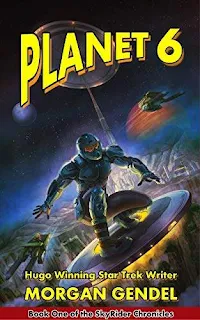Free book promotion on Amazon 11/27/2019 - 12/1/2019!
WHY I WROTE “PLANET 6” by Morgan Gendel
WHY I WROTE “PLANET 6” by Morgan Gendel
Three centuries from now, interlopers from several Earth-colonized planets have infiltrated the military of Earth Colonial Planet 6-2. Enter the Skyriders, members of an elite peacekeeping force loyal to Mother Earth, who patrol the colonies much like Lone Rangers, each on his or her own flying Disc. Zed Hellfinger is merely a cadet, but his allergy to authority puts him at the center of the growing conflict. With no one to trust, he has to go on a wild journey, helped by an acerbic amazon and a curmudgeonly Sergeant as he races to stop a plot that would lead to all-out war.
If my debut sci-fi novel, PLANET 6, looks like a retro pulp book from long, long ago, that's intentional. While I'm best known as writer of the TV episode The Hollywood Reporter calls "Trek's most beloved story" (STAR TREK: THE NEXT GENERATION episode "THE INNER LIGHT"), PLANET 6 is an homage to the fiction I devoured in my teens and 20s. Jules Verne and H.G. Wells wowed me with their future-forward imagination. Consider that before Wells, the phrase “time machine” didn’t exist! His novel of the same name set a tone for the romantic heroism to which I’m still partial – and also to the use of sci-fi to illuminate societal woes such as class structure. Even my young and not-yet-socially-conscious mind couldn’t mistake the implication of the underground Morlocks tending to the pampered Elois, then eating them. Verne’s “20,000 Leagues Under the Sea,” meanwhile, was a master class in world-building and the antagonist-as protagonist, lessons I took with me to my TV career and now to my novel-writing.
Yes, of course, Arthur C. Clarke, Robert Heinlein and Ray Bradbury were on my reading list, especially as I got older. But they didn’t stir my sense of adventure the way Edgar Rice Burroughs did. You probably think I’m going to cite his “Barsoom” series of otherworldly adventures, but it was actually the “Tarzan” novels that enchanted me. I have to conclude that the heroics of an underestimated outsider, which the young Lord Greystoke definitely was, spoke to me. You can see those traits in Planet 6’s young protagonist, Zed Hellfinger.
Ian Fleming was there for me in high school and college. The James Bond novels were all good yarns, loaded with a modern-day version of swashbuckling. When I saw “Goldfinger” on the big screen, you could forgive me for thinking it had more than a touch of, if not sci-fi, then at least the fantastical, with its lasers and dirty nukes and not one but two eye-popping electrocutions.
There was an obvious omission to my list of classic sci-fi authors two paragraphs up but I’ve saved the biggest sci-fi influence on me for last. That would be Isaac Asimov. “The Stars Like Dust” was the first modern sci-fi book I read and it kicked off a decades-long immersion into the Asimov oeuvre. His Galactic Empire, handily traversed via jumps through hyperspace, looked an awful lot like the “Star Wars” Empire and the psychohistory that undergirds his “Foundation” series pre-sages today’s “Big Data.” Asimov instilled in me a love for real science fast-forwarded into the stuff of sci-fi, and you can taste a lot of that flavor in “Planet 6.”
My love of heroism and adventure hasn’t waned. I read every one of Patrick O’Brian’s “Master and Commander” books and missed them so much I then read all the “Horatio Hornblower” books. With my envisioned multi-volume “Skyrider Chronicles” I hope to chart the long life of Zed Hellfinger as he moves up the ranks of his Disc-riding military unit and, as C.S. Forester did with Hornblower, follow the parallel track of his personal life. I should be so lucky!
So why did I write PLANET 6? The answer is that my real dream is that some youngish person today is as moved by my debut novel and its heroics and science and adventure and sci-fi view of political morality as I was – and still am – reading my favorite authors.

